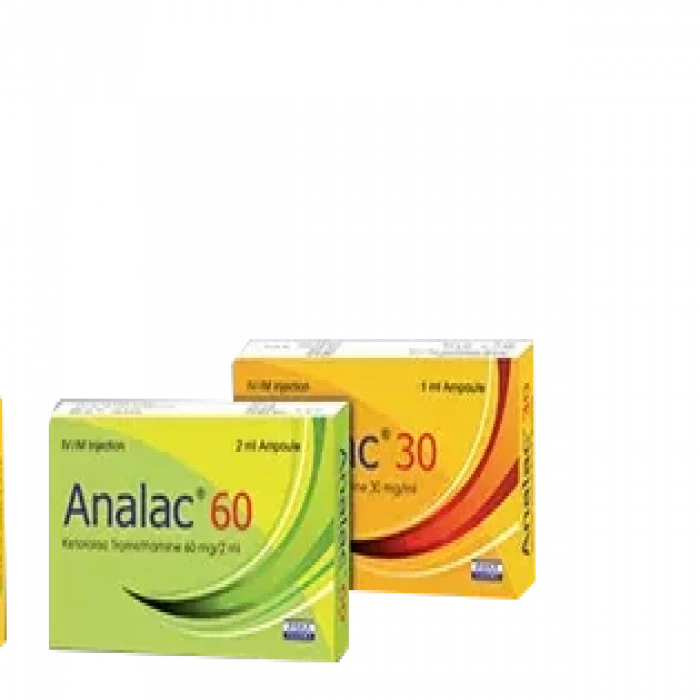
✔ 100% Authentic Product
👁️ Currently Viewing 1389
Arolak Injection-IM/IV 30
Injection
Manufacturer/Distributor: Ambee Pharmaceuticals Ltd.
Generic Name: Ketorolac Tromethamine 30 mg/ml Injection
Discount
Price: ৳ 262
MRP:
৳
275.92
5%
Off

100% Genuine Products, Guaranteed

Safe & Secure Payments, Always

Fast, Secure & Efficient Delivery

Proper Packaging
 Cash on Delivery - All over Bangladesh
Cash on Delivery - All over Bangladesh Regular Delivery - 12-24 Hours, Dhaka City* Charge Tk.39-59
Regular Delivery - 12-24 Hours, Dhaka City* Charge Tk.39-59 Regular Delivery - 24-48 Hours, Other Cities* Charge Tk.99-110
Regular Delivery - 24-48 Hours, Other Cities* Charge Tk.99-110
🌙 রমযান অফার 🌙
 ফ্রি ডেলিভারিঃ - ৭৯৯ টাকা+ অর্ডারে, ঢাকা
শহরে
ফ্রি ডেলিভারিঃ - ৭৯৯ টাকা+ অর্ডারে, ঢাকা
শহরে ফ্রি ডেলিভারিঃ - ২৭৯৯ টাকা+ অর্ডারে, ঢাকার
বাহিরে
ফ্রি ডেলিভারিঃ - ২৭৯৯ টাকা+ অর্ডারে, ঢাকার
বাহিরে
📲 মোবাইল অ্যাপ অর্ডারে সাশ্রয় বেশী
-
Google Play Store থেকে ডাউনলোড
-
Apple Store থেকে ডাউনলোড
100% Genuine Products, Guaranteed
Safe & Secure Payments, Always
Fast, Secure & Efficient Delivery
Proper Packaging
 Cash on Delivery - All over Bangladesh
Cash on Delivery - All over Bangladesh Regular Delivery - 12-24 Hours, Dhaka City* Charge Tk.39-59
Regular Delivery - 12-24 Hours, Dhaka City* Charge Tk.39-59 Regular Delivery - 24-48 Hours, Other Cities* Charge Tk.99-110
Regular Delivery - 24-48 Hours, Other Cities* Charge Tk.99-110 ফ্রি ডেলিভারিঃ - ৭৯৯ টাকা+ অর্ডারে, ঢাকা
শহরে
ফ্রি ডেলিভারিঃ - ৭৯৯ টাকা+ অর্ডারে, ঢাকা
শহরে ফ্রি ডেলিভারিঃ - ২৭৯৯ টাকা+ অর্ডারে, ঢাকার
বাহিরে
ফ্রি ডেলিভারিঃ - ২৭৯৯ টাকা+ অর্ডারে, ঢাকার
বাহিরে- Google Play Store থেকে ডাউনলোড
- Apple Store থেকে ডাউনলোড
🌙 রমযান অফার 🌙
📲 মোবাইল অ্যাপ অর্ডারে সাশ্রয় বেশী
✅ Description:
Indications
Ketorolac Tromethamine is used to treat moderate to severe acute post-operative pain in the short term.
Pharmacology
The non-steroidal anti-inflammatory medication ketorolac tromethamine is a powerful painkiller (NSAIDs). It works by preventing prostaglandin formation by inhibiting the cyclooxygenase enzyme system. At its analgesic dose, it has a minor anti-inflammatory action.
Dosage & Administration
Tablet-
Recommended dose is 10 mg every 4-6 hours. It should be used short-term only (up to 7 days) and are not recommended for chronic use. Doses exceeding 40 mg/day is not recommended.
Injection-
Ketorolac injection may be used as a single or multiple doses, on a regular or when necessary schedule for the management of moderately severe, acute pain that requires analgesia at the opioid level, usually in a postoperative setting. When administering Ketorolac injection, the IV bolus must be given over no less than 15 seconds. The IM administration should be given slowly and deeply into the muscle. The analgesic effect begins within 30 minutes with maximum effect in 1 to 2 hours after dosing IV or IM. Duration of analgesic effect is usually 4 to 6 hours.
Single-Dose Treatment-
IM Dosing (Adult):
Patients <65 years of age: One dose of 60 mg.
Patients >65 years of age, renally impaired and/or less than 50 kg of body weight: One dose of 30 mg.
IV Dosing (Adult):
Patients <65 years of age: One dose of 30 mg.
Patients >65 years of age, renally impaired and/or less than 50 kg of body weight: One dose of 15 mg.
IV or IM Dosing (2 to 16 years of age):
IM Dosing: One dose of 1 mg/kg up to a maximum of 30 mg.
IV Dosing: One dose of 0.5 mg/kg up to a maximum of 15 mg.
Multiple-Dose Treatment (IV or IM)-
Patients <65 years of age: The recommended dose is 30 mg Ketorolac injection every 6 hours. The maximum daily dose should not exceed 120 mg. Patients >65 years of age, renally impaired patients and patients less than 50 kg: The recommended dose is 15 mg Ketorolac injection every 6 hours. The maximum daily dose for these populations should not exceed 60 mg. For breakthrough pain, do not increase the dose or the frequency of Ketorolac Tromethamine.
Conversion from Parenteral to Oral Therapy: Ketorolac tablets may be used either as monotherapy or as follow-on therapy to parenteral Ketorolac. When Ketorolac tablets are used as a follow-on therapy to parenteral Ketorolac, the total combined daily dose of ketorolac (oral + parenteral) should not exceed 120 mg in younger adult patients or 60 mg in elderly patients on the day the change of formulation is made. On subsequent days, oral dosing should not exceed the recommended daily maximum of 40 mg. Ketorolac IM should be replaced by Ketorolac tablet as soon as feasible. The total duration of combined parenteral and oral treatment should not exceed 5 days.
Interaction
Ketorolac Tromethamine's negative effects are exacerbated by other NSAIDs or aspirin.
Anticoagulants: Increase the effectiveness of anticoagulants.
Reduce the antihypertensive effect of beta blockers.
Angiotensin-converting enzyme inhibitors (ACE inhibitors) raise the risk of renal impairment.
Methotrexate: Increase methotrexate toxicity.
Contraindications
Patients who are hypersensitive to ketorolac or other NSAIDs should avoid taking it. It should not be given to youngsters under the age of sixteen. It's also not a good idea to use it as a pre-surgery analgesic.
Side Effects
Nausea, vomiting, gastro-intestinal hemorrhage, melana, peptic ulcer, pancreatitis, anxiety, sleepiness, headache, excessive thirst, fatigue, bradycardia, hypertension, palpitation, chest discomfort, female infertility, and pulmonary edema are some of the most common adverse effects.
Pregnancy & Lactation
Ketorolac Tromethamine is classified as Category C by the US Food and Drug Administration for use during pregnancy. So, unless the potential benefits to the other outweigh the potential hazards to the unborn, Ketorolac Tromethamine should be avoided during pregnancy and lactating.
Precautions & Warnings
Patients over the age of 65 should be treated with caution. Patients with a current or suspected peptic ulcer, gastrointestinal hemorrhage, asthma, or liver failure should use caution.
Therapeutic Class
Non-Opioid Analgesics, Drugs for Rheumatoid Arthritis.
Storage Conditions
Keep away from light and heat in a dry location. Keep out of children's reach.
⚠️Disclaimer:
At ePharma, we’re committed to providing accurate and accessible health information. However, all content is intended for informational purposes only and should not replace medical advice from a qualified physician. Please consult your healthcare provider for personalized guidance. We aim to support, not substitute, the doctor-patient relationship.








